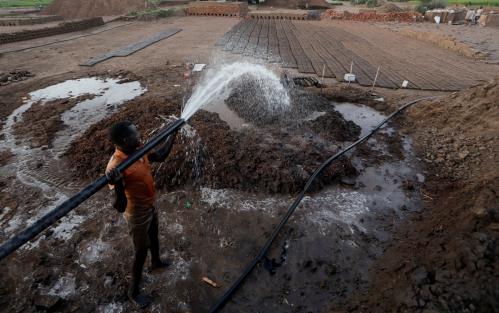Inaugural season of the Basketball Africa League concludes
Early this week, the inaugural season of the Basketball Africa League (or “the BAL”) concluded with Zamalek (Egypt) defeating US Monastir (Tunisia) 76-63 in the championship game held in Kigali, Rwanda. The BAL’s first season, a joint product of the International Basketball Federation (FIBA) and the National Basketball Association (NBA), consisted of 12 teams that qualified for the league after winning domestic championships. The BAL’s schedule was widely publicized, drawing sponsorship from Nike, Pepsi, and Air Jordan and airing in 15 languages across 215 countries/territories. The league also aimed to use its opening season to celebrate African basketball forerunners and former NBA stars such as Hakeem Olajuwon of Nigeria, Dikembe Mutombo of the Democratic Republic of the Congo, and Manute Bol of South Sudan, to whom the league paid homage following the championship game and after whom the league named its end-of-season awards.
Walter Hodge of Zamalek was declared the Hakeem Olajuwon BAL Most Valuable Player, after averaging 15.5 points, 5.7 assists, and 5.0 rebounds per game. After the championship game, Hodge expressed excitement about the future of the league, saying, “This is the first time this league is here, and it’s going to be here for a long time.”
Vaccine shortages hamper COVID-19 fight in Africa
On June 3, the World Health Organization Regional Office for Africa confirmed a recent surge in COVID-19 cases on the continent and urged African countries to boost critical care capacity to prevent health facilities from being overwhelmed. Indeed, over the last two weeks, Africa recorded a 20 percent increase in cases. Uganda alone saw a 131 percent rise from last week to this current one. South Africa has experienced a more than 60 percent rise in new cases. In addition, Reuters recently reported that, in the Democratic Republic of the Congo (DRC), COVID-19 has killed 32 members of parliament—5 percent of its total members. Moreover, the country’s vaccine campaign has not stabilized after it delayed the rollout of the AstraZeneca vaccine over health concerns. As a result, the DRC reallocated 75 percent of its vaccines to neighboring countries before they expired.
Efforts to stem the spread continue to fall short: Vaccine shortages persist—in fact, coming to a “near halt”—and the care of critical COVID-19 patients continues to lag behind other parts of the world. According to the Africa Centers for Disease Control and Prevention, Africa has administered about 60 percent of its supply while only 0.6 percent of its population has been fully vaccinated. Some countries, like Tanzania and Chad, have not started vaccination while others have only just begun.
The problems with vaccine rollout, according to Deutsche Welle, seem to stem from a standstill of the COVAX program in March. With India suspending vaccine exports after the intense outbreak in that country, the Serum Institute of India—which was Africa’s most important source of vaccines at the time—was no longer exporting vaccines to Africa.
However, on Thursday, June 3, the Biden administration unveiled its framework for sharing at least 80 million vaccine doses by the end of June with the rest of the world; 75 percent of these doses will go through COVAX. As part of this effort and in coordination with the African Union, African countries can expect 5 million doses of the COVID-19 vaccine.
Despite these surges, other parts of the continent are beginning to open up. For example, on Tuesday, Algeria partially reopened air travel after a 14-month shutdown due to the pandemic. According to AP, the first flight will take off to Paris and another is expected to land in the capital Algiers. Those planning to travel to Algiers must have a negative test result less than 36 hours before boarding. Flight destinations will be limited to five cities: Paris, Marseille, Barcelona, Tunis, and Istanbul.
Security updates in Chad, CAR, Egypt, Sudan, Mali, and Uganda
On Sunday, Chad’s defense ministry accused Central African Republic (CAR) troops of attacking a Chadian military post, killing a soldier, and kidnapping and executing five soldiers—actions that the Chadian defense ministry considers war crimes. The CAR communications ministry explained the incident was a mistake that occurred as CAR government forces pursued rebel groups near the Chad border. Tensions between the two countries, who share a porous 1,500 kilometer border, have flared due to instability in the CAR since a rebellion in 2013 deposed former President Francois Bozize. Since then, a steady flow of CAR refugees continue to enter Chad, fleeing conflict between CAR government forces and Muslim Seleka rebels.
On Monday, Egypt and Sudan completed a joint war-games exercise. The six-day military exercise was a show of force and representation of the deepening security relationship between the neighboring countries amid rising tensions with Ethiopia. These tensions stem from the construction of Ethiopia’s controversial and unfinished Grand Ethiopian Renaissance Dam along the Blue Nile River—the main tributary of the Nile River.
In response to last week’s coup in Mali, the country’s second coup this year, France announced that it is suspending its joint military operations with the West African country. France remains committed to halting their joint military operations until Mali produces guarantees that it will return to civilian rule. The Economic Community of West African States (ECOWAS) and the African Union have also officially reprimanded Mali, suspending the country from the regional bloc and calling for “the immediate appointment of a new civilian prime minister and the formation of an inclusive government.” ECOWAS’s response, however, did not impose new sanctions against Mali, although the regional bloc maintains its sanctions against Mali over last August’s coup.
In other news, on Tuesday, gunmen attacked Uganda’s minister of works and transports, General Katumba Wamala. General Wamala, a former army chief and top general, survived the attack and sustained an arm wound, but his daughter and driver were both fatally shot. Tuesday’s shooting follows a series of motorcycle-riding assassination attempts throughout the years aimed at high-profile targets in Uganda’s capital. None of these killings and attempted assassinations have been successfully investigated or prosecuted.







Commentary
Africa in the news: Basketball Africa League, COVID-19, and security updates
June 5, 2021